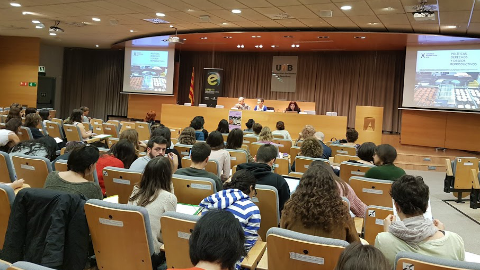International experts to create a world map of reproductive policies

25/10/2017
Egg donation or provision? Anonymous sperm and embryos? Altruistic or legalised surrogate gestation? Access to a voluntary termination of pregnancy starting when? These are some of the questions looking to be answered by members of the X AFIN International Conference: Reproductive Politics, Rights and Desires, which will be held from 2 to 4 November at the Bellaterra campus and in Barcelona. The conference is organised by the UAB's AFIN Research Group and the UB's Research Group in Gender, Identity and Diversity.
The objective of the conference is to create a map of changes in reproductive and social practices around the world. Debates will focus on the multiple manners in which individuals and couples fight for their reproductive rights and desires within a heterogenous, conflictive and sometimes paradoxical political and legal environment.
The conference will begin at 10 a.m. on Thursday 2 November at the Sala d'Actes of the Rectorat building. the opening speeches will be given by Sara Moreno, Vice Rector for Students and Employability; Joan Carbonell, Dean of the Faculty of Arts and Humanities; and Diana Marre, Director of the UAB's AFIN Centre. On 3 and 4 November the conference will take place at the Aula Magna of the UB Faculty of Geography and History (Carrer Montalegre 6, Barcelona).
Among the speakers, experts, professors and researchers atending the conference there will be Michal Nahman from the University of the West of England, specialist in "reproductive tourism" and "egg donation"; Sebastian Mohr from the University of Copenhagen, specialist in sperm donation and in the largest sperm bank based in Denmark; Elly Teman from Israel, specialist in surrogate gestation in Israel and United States; Marcin Smietana from the University of Cambridge, specialist in surrogate gestation for gay families in the United States; and Amrita Pande from the University of Cape Town, South Africa, specialist in surrogate gestation in India.
In the past three decades, many European countries have undergone drastic demographic changes. The main results of this are a reduction in family size and fertility index which has not recovered. The countries of southern and eastern Europe, such as Spain, Italy and Poland, have the lowest fertility indexes of the world.
At the same time, this demographic change is also a consequence of reproductive deceptions caused by gender inequality in the workplace and the disability to balance work and family, with little economic help. Raising children has become more intense and the availability of assisted reproduction techniques has transformed reproduction into an individual choice which can be taken at a more advanced age.
A massive postponement of maternity can produce age-related fertility problems. According to the World Health Organisation, at the start of 2015 more than 80 million couples with fertility problems were using assisted reproductive technologies to become pregnant, followed by a growing number of singles and same-sex couples. Since the 1980s, western European countries have modified their laws to legalise and include assisted reproductive treatments using donations, surrogate mothers, adoption and fostering.
Current debates on reproductive rights focus not only on contraception and abortion, but also on the right to become parents using new technologies or reproductive adoptions, as well as the legal, procedural and social barriers which prevent individuals and couples to reach their desired reproductive objectives or have access to contraception and abortion methods.
Nevertheless, anti-conception and even abortion is not easily attainable in all countries, and there is still a strong opposition to abortion in public debates, including in European countries in which it has been legal for many decades. Moreover, not all reproductive technologies are legalised or easily accessible. Inequalities in this access, as well as gender and social inequalities lead many individuals and couples to search for alternatives and even travel to other countries to make their parenting wishes come true.
To see the programe click here.